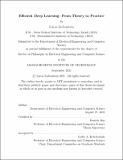Efficient Deep Learning: From Theory to Practice
Author(s)
Liebenwein, Lucas
DownloadThesis PDF (9.268Mb)
Advisor
Rus, Daniela
Terms of use
Metadata
Show full item recordAbstract
Modern machine learning often relies on deep neural networks that are prohibitively expensive in terms of the memory and computational footprint. This in turn significantly inhibits the potential range of applications where we are faced with non-negligible resource constraints, e.g., real-time data processing, embedded devices, and robotics. In this thesis, we develop theoretically-grounded algorithms to reduce the size and inference cost of modern, large-scale neural networks. By taking a theoretical approach from first principles, we intend to understand and analytically describe the performance-size trade-offs of deep networks, i.e., the generalization properties. We then leverage such insights to devise practical algorithms for obtaining more efficient neural networks via pruning or compression. Beyond theoretical aspects and the inference time efficiency of neural networks, we study how compression can yield novel insights into the design and training of neural networks. We investigate the practical aspects of the generalization properties of pruned neural networks beyond simple metrics such as test accuracy. Finally, we show how in certain applications pruning neural networks can improve the training and hence the generalization performance.
Date issued
2021-09Department
Massachusetts Institute of Technology. Department of Electrical Engineering and Computer SciencePublisher
Massachusetts Institute of Technology